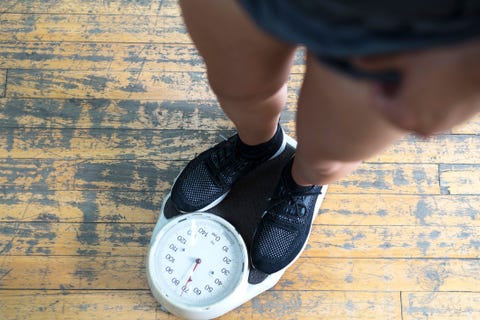The 3-Day Military Diet Says You Can Lose up to 10 Pounds in 1 Week
A-TEN-TION!
Listen up here, private! There’s a NEW diet in town and it’s not taking any GUFF from you or anybody else! That’s because it’s set up like a BOOTCAMP, you see. It’s going to be TOUGH! It’s going to be ROUGH! But it’s going to whip you into SHAPE so that you can get moving and start fighting through your days with the vim and vigor needed to FINALLY MAKE A SOLIDER OUT OF YOU.
Or, at least, this is what The Military Diet promises. On its eating plan, you will drop weight fast—as much as 10 pounds in a week, according to its totally weird website.
If that promise wasn’t alluring enough, The Military Diet claims that you can do this without exercise while eating saltine crackers and vanilla ice cream.
That promise sounds kind of awesome if you’re the type of person looking to lose weight quickly. And maybe you even like the tough-love approach.

But before you enroll in The Military Diet, there are a few very important (and very strange) things you need to know about this Internet-famous diet.
So what’s up with this mysterious diet? Where does it come from, and is it at all legit?
Here’s what you should know.
What is The Military Diet?
According to its website, The Military Diet requires you eat specific foods for breakfast, lunch, and dinner over the course of three days. The meal plan is extremely calorie-restrictive: on the first day, for instance, you can only eat roughly 1,078 calories. (For comparison, the average, moderately active male needs roughly 2,400 to 2,600 calories per day.)
After the initial three-day period, you can eat whatever you want for the next four days, as long as you don’t consume more than 1,500 calories. If you do this for a whole month, you can lose up to 30 pounds, according to the website.

So what do you eat on the Military Diet? Here’s a sample plan.
Breakfast
Lunch
Dinner
The website offers substitutions for people who don’t like, or can’t eat, certain foods. For example, if you hate grapefruit, you’ll get the same weight loss benefits by drinking baking soda in your water. (Uhhhh, yum?)
Why is it called The Military Diet?
Honestly? No one knows.

While TheMilitaryDiet.com offers plenty of information, including a section with frequently asked questions, a blog, and alternative meal plans for vegetarians, there are no authors, experts, or webpage owners listed.
And while the name implies a military connection, the page doesn’t actually claim any ties to the armed forces. (MensHealth.com reached out to the website for more information and will update if and when we hear back.)
So, point blank, there’s no actual accreditation or science behind The Military Diet.
We do know, however, that the plan has previously gone by other names, such as the Cleveland Clinic diet, the Mayo Clinic diet, the Kaiser diet, and the Birmingham Hospital diet. According to CNN.com, none of these organizations have actually endorsed the diet.
We also know that The Military Diet is not associated with the armed forces in any way, says Roland Paquette, PA-C, an assistant professor in physician assistant studies at UT Health San Antonio.
A former Green Beret who served in the United States Special Forces from 2004 to 2006, Paquette tells MensHealth.com that the army did not institute a specific diet to get cadets into shape.
“I pretty much ate everything that was available, because you’re so active all the time,” Paquette says. He adds that pancakes, French toast, and biscuits and gravy were common breakfast menu items—none of which are on The Military Diet.
Maj. Carla Gleason, a spokeswoman for the Pentagon, confirmed this. She told MensHealth.com that the United States Department of Defense does not endorse any meal or diet plan outside of what’s listed in its Warfighter Nutrition Plan, a guide that was developed to meet the nutritional needs of service members.
Is The Military Diet safe or healthy?
Yes, severe calorie restriction often leads to weight loss, but what you’re likely losing is water and muscle. Worse still, under-eating (active men are supposed to consume 2,800 calories a day), can lead to brain fog, poor sleep, bad moods, and colossal cravings that may turn to binge eating.

According to Paquette, the Military Diet does have one advantage over other weight loss plans: unlike other diets like keto, which tend to eliminate entire food groups, The Military Diet includes a mix of protein, carbohydrates, and fats, albeit in tiny amounts.
That said, Paquette says the guidelines for the diet are simply too general to be considered healthy. For instance, breakfast on the first day simply lists “toast,” without specifying whether it’s whole-wheat or white.
“It’s hard to say exactly looking at the foods whether they’re good for you or not,” he says.
Can you really lose 10 pounds in one week?
Sure, this plan could help you lose weight, but probably not 10 pounds— and definitely won’t help you keep it off long-term. Most of it is likely to be water weight, according to our experts.

Kristen Kizer, a registered dietitian at Houston Methodist Hospital, says that while the Military Diet website claims that the specific foods you eat on the diet can help you “burn fat,” that’s just not the case.
“The Military Diet has ‘fad diet’ written all over it, claiming special food combinations can help you lose weight and allowing for unhealthy fake foods, like hot dogs and one cup of ice cream,” she says.
Most health professionals advise only losing one to two pounds per week, and “even this can be challenging” for some people, says Kizer. Weight loss depends on such a wide range of factors, from genetics to body weight, that it’s impossible to make the claim that one diet will help everyone lose a certain amount of weight in a given time frame.
Even if you do lose a few pounds, it’ll probably water weight that will be regained, Kizer adds. Plus, as is the case with yo-yo dieting and fasting in general, a “feast-or-famine cycle can have negative long-term effects on your metabolism,” she explains, making it easier for you to regain the weight you’ve lost.
Dieters are encouraged to pair the diet with intermittent fasting for better results. If you’re not aware, intermittent fasting calls for eating not eating between 16 hours to an entire day. The Military Diet encourages eating during an 8-hour window while fasting for the remaining 16 hours each day to increase fat burning.
Can you snack on The Military Diet?
Technically, no.

According to The Military Diet website, extra food and snacks cannot be added to the outlined plan. However, it is possible to save food from each meal to eat at different times.
For example, you could treat yourself to the vanilla ice cream as an afternoon snack instead of eating it at dinner.
As the website claims, “Spacing out your food won’t make any difference to the diet’s results. Just don’t eat food that’s not listed on the diet!”
Can you drink alcohol on The Military Diet?
Nope, and that’s to keep calories low.
What’s the right way to lose weight?
As any successful dieter or medical professional can tell you, slimming down takes time.”Weight loss is a long-term game,” Paquette says.
Dr. Holly Lofton, director of the medical weight management program at NYU Langone Health, recommends people start by keeping a food journal to monitor average daily caloric intake. Then look at where you can make easy changes: for example, by cutting three slices of bread at dinner down to two.
It’s best to start slowly by removing empty calories from processed foods, snacks, and beverages, she advises. And of course, a healthy diet should include plenty of vegetables, high-fiber fruits and protein.
Simply put: low-calorie diets like the Military Diet may help you shed a pound or two in the short-term, but they’ll never give you long-lasting results.
“We’ve learned almost any fad diet will help you lose weight, but the regain rate is high,” says Kizer. “No one likes to hear it, but small, realistic changes done by the whole family with good social support is still the best way to make lasting change.”
At the end of the day, both Paquette and Kizer agree that the Military Diet probably does more harm than good.
“Do I think it could be detrimental to the millions of Americans who already have an unhealthy relationship with food?,” says Kizer. “Yes.”
The Bottom Line: Just because you’re losing weight doesn’t mean that you’re healthy—especially on this vague, too-low-calorie diet that has no scientific backing. Even if you can eat pretty much anything you want on the Military Diet, this is no way to live, soldier.
Source: Read Full Article


